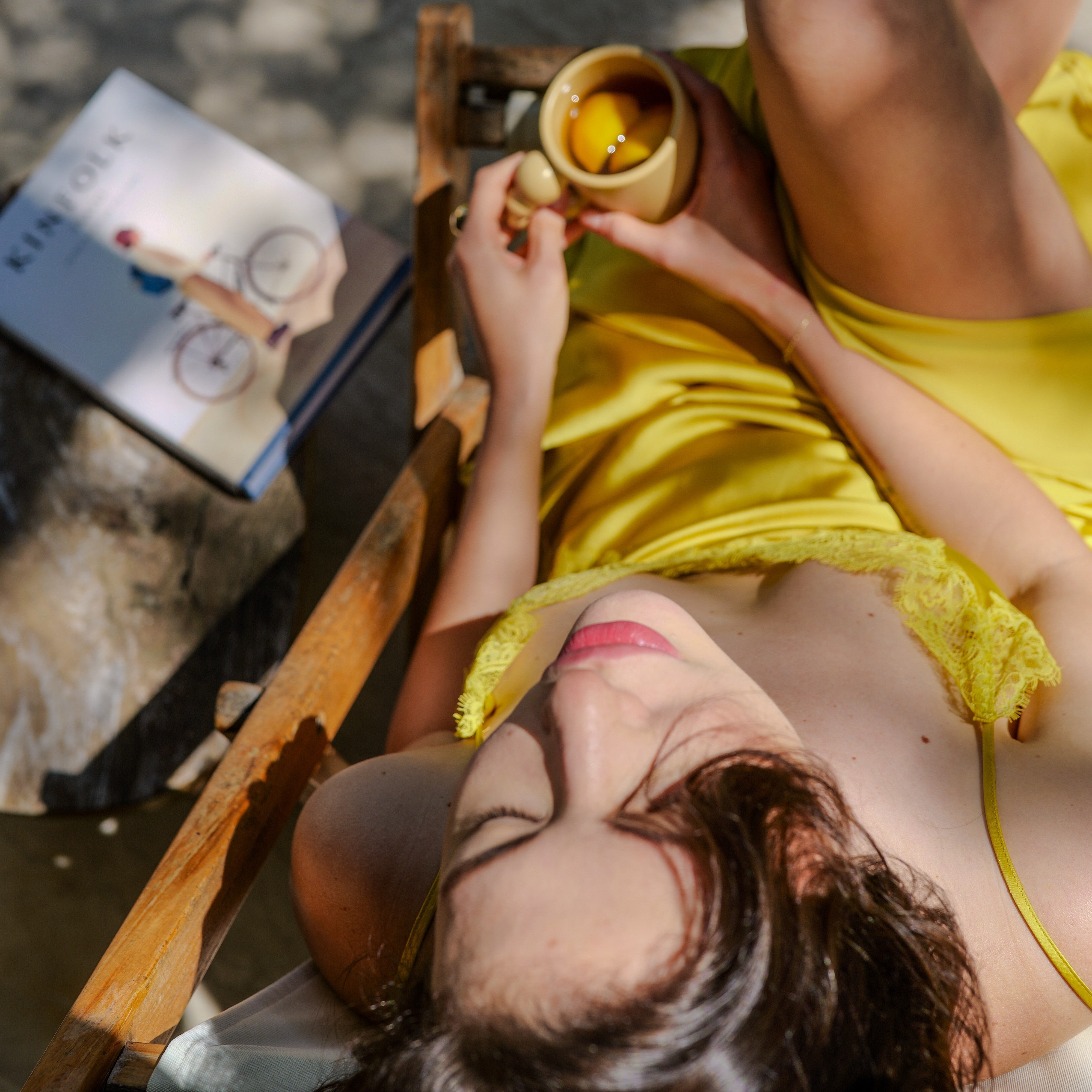photo credit: @medella
Anxiety doesn’t always show up as panic attacks or full-blown meltdowns.
Sometimes it’s just quiet restlessness, racing thoughts, tension in your chest. The feeling that you're one step behind, even when nothing’s actually wrong.
The truth? You don’t need to overhaul your life to feel better.
There are simple daily habits, small things you can actually stick to that can retrain your nervous system and lower anxiety over time. And yep, there’s science to back it up.
Let’s get into it.
1. Morning Sunlight (10–20 Minutes)
Why it helps:
Getting light in your eyes within the first hour of waking helps regulate your circadian rhythm, which in turn balances your cortisol and melatonin levels, two hormones directly tied to stress and mood.
What to do:
- Go outside for 10–20 minutes within 30–60 minutes of waking
- No sunglasses, no windows—real light in your eyes
- Even a cloudy day is better than indoor light
Science: Morning sunlight boosts serotonin production and improves sleep quality, both of which reduce anxiety (LeGates et al., 2014; Huberman Lab, 2022).
2. Breathwork—Specifically Exhale-Heavy Breathing
Why it helps:
Long exhales activate your parasympathetic nervous system, signaling to your body that you're safe. It literally tells your brain, “You can calm down now.”
What to do:
Try this: inhale for 4 seconds, exhale for 6–8 seconds. Do it for 2–5 minutes when you feel overwhelmed—or build it into your morning.
Science: Exhale-focused breathing lowers heart rate and blood pressure, reducing anxiety symptoms fast (Noble & Hochman, 2019).
3. Reduce Caffeine (or Time It Strategically)
Why it helps:
Caffeine can spike cortisol, mimic anxiety symptoms, and throw off your natural energy rhythm—especially if you're already feeling wired.
What to do:
- Delay your first cup of coffee 90 minutes after waking (let cortisol rise naturally first)
- Don’t drink caffeine on an empty stomach
- Cut it off by 1–2 PM to protect your sleep
Science: High doses of caffeine (especially over 400mg/day) are linked to increased anxiety, jitteriness, and poor sleep (Nehlig, 2016).
4. Move Your Body (Daily, Not Perfectly)
Why it helps:
Exercise is one of the most reliable natural anxiety reducers. It increases GABA (a calming neurotransmitter), lowers stress hormones, and moves stuck energy through the body.
What to do:
- Aim for 20–30 minutes of movement most days
- Walking counts
- Yoga, strength training, dancing—all fair game
Science: Regular aerobic activity significantly reduces anxiety and improves stress resilience
(Asmundson et al., 2013; Rebar et al., 2015).
5. Limit Dopamine Spikes (AKA Stop Overstimulating Your Brain)Why it helps:
Constant stimulation (scrolling, multitasking, notifications) keeps your nervous system on high alert. The more dopamine hits you chase, the harder it becomes to focus, rest, or feel content.
What to do:
- Keep mornings tech-free for the first 30 minutes
- Turn off unnecessary notifications
- Don’t jump between apps every 30 seconds
Science: Overstimulation leads to dopamine resistance, which can make anxiety worse and make everyday life feel overwhelming (Volkow et al., 2010).
6. Eat to Stabilize Blood Sugar
Why it helps:
Blood sugar crashes feel almost identical to anxiety: shaky hands, heart racing, irritability, brain fog. Keeping glucose steady is one of the most underrated anxiety tools.
What to do:
- Eat protein and fat at every meal
- Don’t skip breakfast
- Avoid high-sugar snacks on an empty stomach
Science: Fluctuating blood glucose is linked to mood swings, irritability, and anxiety symptoms
(Manschot et al., 2007).
7. Magnesium + Minerals (Your Nervous System’s Fuel)
Why it helps:
Magnesium calms the brain, regulates the stress response, and supports over 300 biochemical reactions. Many people are deficient—and the more stressed you are, the more you burn through it.
What to do:
- Eat magnesium-rich foods: dark leafy greens, pumpkin seeds, almonds, avocado
- Consider supplementing with magnesium glycinate or magnesium L-threonate
Science: Magnesium supplementation has been shown to reduce mild to moderate anxiety in adults (Boyle et al., 2017).
8. Prioritize Sleep Like Your Life Depends On ItWhy it helps:
Lack of sleep increases amygdala reactivity—that’s the part of your brain responsible for fear and emotional response. A tired brain is an anxious brain.
What to do:
- Aim for 7–9 hours consistently
- No screens 1 hour before bed
- Keep the room dark, cool, and quiet
- Try a magnesium drink or herbal tea (chamomile, lemon balm, passionflower)
Science: Sleep deprivation amplifies anxiety by up to 30% and disrupts emotion-regulation networks in the brain (Ben Simon et al., 2020).
9. Connect. In Real Life.
Why it helps:
Humans are wired for connection. Even small amounts of face-to-face time with people you trust can calm your nervous system and reduce the physical symptoms of anxiety.
What to do:
- Schedule a walk with a friend
- Talk to someone without distractions (no phone in hand)
- Eye contact and laughter are seriously medicinal
Science: Social connection increases oxytocin and reduces cortisol—both of which are protective against anxiety (Heinrichs et al., 2003).
10. Rewire with Gratitude (Yes, It Actually Works)
Why it helps:
Gratitude literally changes your brain: activating areas tied to empathy, reward, and emotional regulation. Over time, it shifts your baseline state from anxious to grounded.
What to do:
- Write down 3 very specific things you’re grateful for each morning
- Think small: “Sun on my skin,
” “Warm shower,
” “Friend who texted back”
- Don’t just list them. Feel them.
Science: Gratitude practices are linked to reduced anxiety, improved sleep, and better emotional resilience (Kerr et al., 2015).Anxiety isn’t just in your head, it’s in your nervous system, your hormones, your habits, and your environment.
The good news? That means there’s a lot you can do to shift it.
Start with one or two of these habits. Build slowly. Be consistent.
Your nervous system learns through repetition and the more you show it you’re safe, the more that becomes your default.
You don’t need to be perfectly calm. You just need to show up for yourself.





